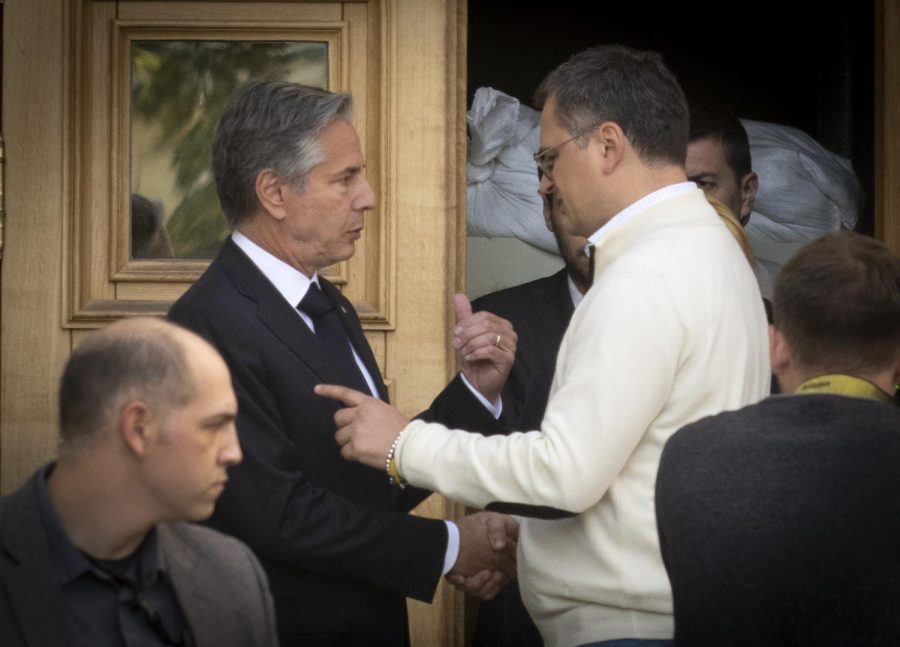Opinion: We need to stop sending military aid to Ukraine
U.S. Secretary of State Antony Blinken, second left, and Ukrainian Foreign Minister Dmytro Kuleba talk during their meeting in Kyiv, Ukraine, Thursday, Sept. 8, 2022. Blinken on Thursday announced major new military aid worth more than 2 billion dollars for Ukraine and other European countries threatened by Russia.
The United States needs to stop sending military aid to Ukraine.
President Joe Biden announced Aug. 24 that his administration would be sending nearly $3 billion in military aid to Ukraine. As the student loan forgiveness plan and stateside matters like inflation dominated American media, the news of this package went under the radar.
With this new package, the total amount of military aid to Ukraine under the Biden administration adds up to over $13 billion. This does not include the additional $19 billion in commitments for financial and humanitarian aid spending. With all this spending while problems lie at home, the United States should stop sending military aid to Ukraine.
Despite not being part of the North Atlantic Treaty Organization, Ukraine has gotten the support from member nations. Since the Russian invasion of Ukraine in February, the United States has committed over $24 billion in military funding to the Ukrainian resistance effort. Among the other NATO member nations, the U.K. is committing the second most with about $4 billion. This makes the United States the largest contributor by far, despite the conflict being contained to eastern Europe. With this being the case, the bill should be delegated to the European powers if NATO is to continue siding with Ukraine.
A controversial group within the Ukrainian fighting force is the Azov Battalion. “The Azov Battalion is an extreme-right nationalist paramilitary organization based in Ukraine,” according to the Center for International Security and Cooperation. “Founded in 2014, the group promotes Ukrainian nationalism and neo-Nazism.” The volunteer group is a part of the Ukrainian National Guard that supports Nazi ideals.
With the Azov Battalion being a part of the fighting force, the United States risks its weapons falling into neo-Nazi hands. While past acts have had provisions to prevent aid to Azov, Ambassador Bonnie Denise Jenkins said “the potential for illicit diversion of weapons is among a host of political-military and human rights considerations,” when asked about the security of U.S. arms in a briefing in July.
While not all Ukrainian fighters believe in this ideology, it is important to note that Azov is a powerful group that we should be weary of providing aid to. When the United States aided in the resistance of the Soviet Union in Afghanistan during the 1980s, the Taliban emerged as a dominant power. When nuanced foreign affairs come into play, we must be careful on distributing military aid.
As the Ukrainians have recently begun a counter offensive campaign, we must ask ourselves how much longer are we going to keep up this funding. As wrong as the invasion of Ukraine is, we shouldn’t be so hasty to throw money at the Ukrainians while economic and infrastructural problems continue back home. It is not the duty of the United States to be involved in these types of foreign conflicts, yet we are using this conflict as a proxy war with Russia.















